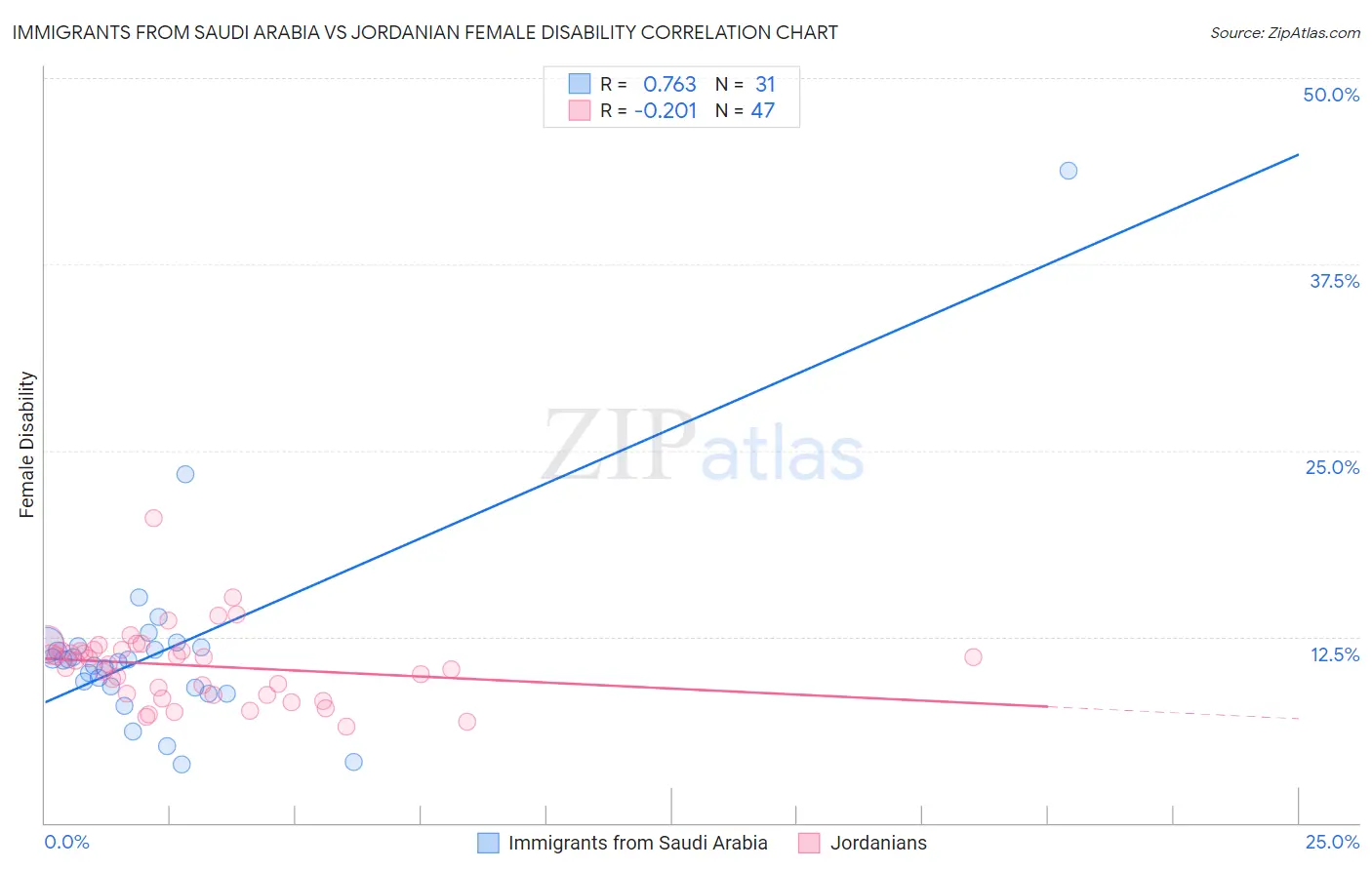Immigrants from Saudi Arabia vs Jordanian Female Disability
COMPARE
Immigrants from Saudi Arabia
Jordanian
Female Disability
Female Disability Comparison
Immigrants from Saudi Arabia
Jordanians
11.3%
FEMALE DISABILITY
99.9/ 100
METRIC RATING
53rd/ 347
METRIC RANK
11.3%
FEMALE DISABILITY
100.0/ 100
METRIC RATING
47th/ 347
METRIC RANK
Immigrants from Saudi Arabia vs Jordanian Female Disability Correlation Chart
The statistical analysis conducted on geographies consisting of 164,285,466 people shows a strong positive correlation between the proportion of Immigrants from Saudi Arabia and percentage of females with a disability in the United States with a correlation coefficient (R) of 0.763 and weighted average of 11.3%. Similarly, the statistical analysis conducted on geographies consisting of 166,415,888 people shows a weak negative correlation between the proportion of Jordanians and percentage of females with a disability in the United States with a correlation coefficient (R) of -0.201 and weighted average of 11.3%, a difference of 0.48%.

Female Disability Correlation Summary
| Measurement | Immigrants from Saudi Arabia | Jordanian |
| Minimum | 3.9% | 6.5% |
| Maximum | 43.8% | 20.5% |
| Range | 39.8% | 14.0% |
| Mean | 11.6% | 10.6% |
| Median | 10.9% | 10.9% |
| Interquartile 25% (IQ1) | 9.1% | 8.6% |
| Interquartile 75% (IQ3) | 11.9% | 11.6% |
| Interquartile Range (IQR) | 2.8% | 3.0% |
| Standard Deviation (Sample) | 6.9% | 2.5% |
| Standard Deviation (Population) | 6.8% | 2.5% |
Demographics Similar to Immigrants from Saudi Arabia and Jordanians by Female Disability
In terms of female disability, the demographic groups most similar to Immigrants from Saudi Arabia are Immigrants from Peru (11.3%, a difference of 0.040%), Peruvian (11.3%, a difference of 0.060%), Bulgarian (11.3%, a difference of 0.070%), Immigrants from Belgium (11.3%, a difference of 0.16%), and Inupiat (11.3%, a difference of 0.24%). Similarly, the demographic groups most similar to Jordanians are Zimbabwean (11.3%, a difference of 0.0%), Tongan (11.3%, a difference of 0.010%), Immigrants from Nepal (11.3%, a difference of 0.020%), Immigrants from Sweden (11.3%, a difference of 0.060%), and Cambodian (11.3%, a difference of 0.10%).
| Demographics | Rating | Rank | Female Disability |
| Mongolians | 100.0 /100 | #40 | Exceptional 11.2% |
| Paraguayans | 100.0 /100 | #41 | Exceptional 11.2% |
| Israelis | 100.0 /100 | #42 | Exceptional 11.2% |
| Afghans | 100.0 /100 | #43 | Exceptional 11.2% |
| Cambodians | 100.0 /100 | #44 | Exceptional 11.3% |
| Immigrants | Sweden | 100.0 /100 | #45 | Exceptional 11.3% |
| Immigrants | Nepal | 100.0 /100 | #46 | Exceptional 11.3% |
| Jordanians | 100.0 /100 | #47 | Exceptional 11.3% |
| Zimbabweans | 100.0 /100 | #48 | Exceptional 11.3% |
| Tongans | 100.0 /100 | #49 | Exceptional 11.3% |
| Inupiat | 100.0 /100 | #50 | Exceptional 11.3% |
| Immigrants | Belgium | 100.0 /100 | #51 | Exceptional 11.3% |
| Immigrants | Peru | 99.9 /100 | #52 | Exceptional 11.3% |
| Immigrants | Saudi Arabia | 99.9 /100 | #53 | Exceptional 11.3% |
| Peruvians | 99.9 /100 | #54 | Exceptional 11.3% |
| Bulgarians | 99.9 /100 | #55 | Exceptional 11.3% |
| Taiwanese | 99.9 /100 | #56 | Exceptional 11.4% |
| South Americans | 99.9 /100 | #57 | Exceptional 11.4% |
| Laotians | 99.9 /100 | #58 | Exceptional 11.4% |
| Immigrants | Spain | 99.9 /100 | #59 | Exceptional 11.4% |
| Immigrants | Bulgaria | 99.9 /100 | #60 | Exceptional 11.4% |